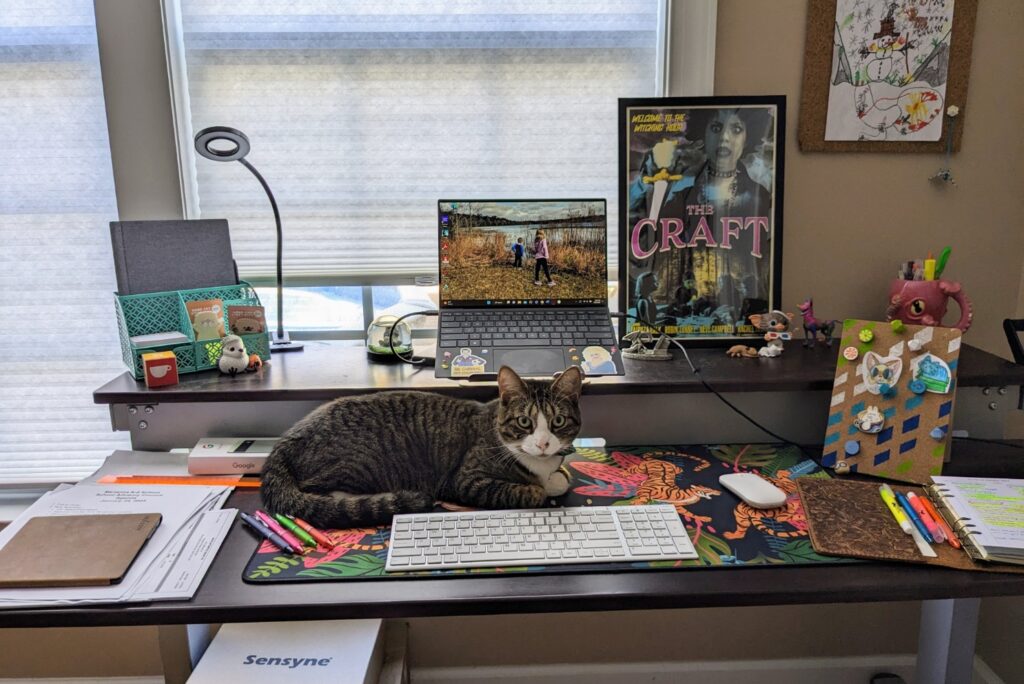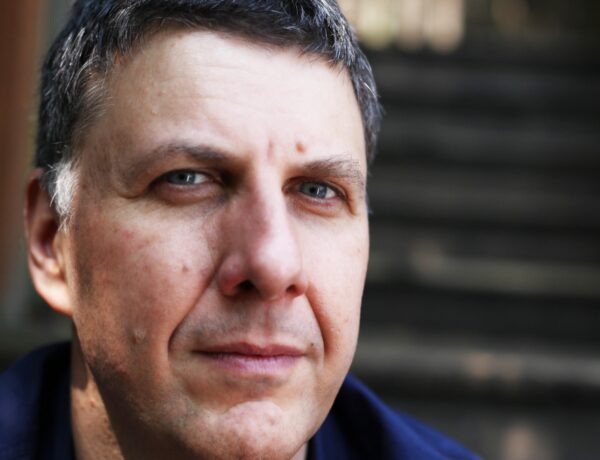Award-winning and bestselling author Kelly J. Baker is a freelance writer with a religious studies PhD who covers religion, racism, higher education, gender, labor, motherhood, and popular culture.
She’s written for The New York Times, The Atlantic, The Rumpus, Killing the Buddha, and others. She’s the author of five books: Gospel According to the Klan: The KKK’s Appeal to Protestant America, 1915-1930 (University Press of Kansas, 2011), Grace Period: A Memoir in Pieces (Blue Crow Books, 2017), Sexism Ed: Essays on Gender and Labor in Academia (2017), The Zombies Are Coming: The Realities of the Zombie Apocalypse in American Culture (Revised and Expanded Edition, Blue Crow Books, 2020), and Final Girl: And Other Essays on Grief, Trauma, and Mental Illness (Blue Crow Books, 2020).
Each week, we publish a new daily writing routine from a famous author. Subscribe to our newsletter so you don’t miss out!
Hi Kelly, great to have you on Famous Writing Routines. We’re really excited to talk to you about your writing routine and process. For those who may not know, can you please tell us a little bit about yourself?
Thanks for having me! And sure, I’m the author of five books—one academic monograph, Gospel According to the Klan: The KKK’s Appeal to Protestant America; two trade books, The Zombies Are Coming: The Realities of the Zombie Apocalypse in American Culture, Revised and Expanded Edition and Sexism Ed: Essays on Gender and Labor in Academia, and two memoirs, Grace Period: A Memoir in Pieces and Final Girl: And Other Essays on Grief, Trauma, and Mental Illness.
I am an essayist, historian, and journalist, who happens to have a religious studies PhD. Let’s see what else. Oh, I spend way too much time on Twitter and Instagram. When I am not writing, I also wrangle a 14-year-old, a 9-year-old, and four cats, who are supposed to help me write but never really do, while always on the look out for alligators and other Florida fauna.
Can you take us behind the creative process for your latest book, Final Girl?
Let me first say that Final Girl might have been the hardest book that I’ve ever written because it is about hard stuff: childhood trauma, living with mental illness, loss and grief, and surviving all of these. It wasn’t a book that I ever intended to write. I accidentally wrote it because I kept writing these essays—these painfully true essays—thinking that I was writing about one thing and then realizing later that I was writing about something entirely else.
Later I would be like, “Oh, wow, no, that’s an essay on trauma or mental illness or how unrelenting grief can be not what I thought it was.” I was writing around these topics again and again and again and over and over, you know, until I recognized that I had something important to say about survival and how long it took me to identify myself as a survivor.
It’s a memoir that didn’t start out as a memoir. Instead, it’s my story in fragments that I could tell, avoiding all the things I couldn’t. The creative process involved a lot of starting and stopping and wishing I wasn’t a writer and starting again.
But, everything really clicked when I turned to horror as a way to interpret some of what I went through and adopted the idea of the final girl, the girl left standing at the end of the horror movie, as the way to orient the book. It might sound weird, but there was something really comforting to frame my memoir-in-essays as a final girl story because it meant that I made it to the end of the story. I had lived to tell the tale.
Throughout my life, I’ve been a horror buff off and on, so horror stories make sense to me, and they helped me make sense of some of what I had experienced. Finding cultural narratives that resonated with me allowed me to rework my own stories in ways that centered me as a survivor. Much of the creative process for this book was learning to retell stories about myself that got rid of abusers’ stories about me that I took as truth and required me to find my truths and tell different stories. It was not easy work, but I think it was worth it.
Discover the daily writing habits of authors like Stephen King, Neil Gaiman, and Gillian Flynn with Famous Writing Routines Vol. 1 and learn how to take your writing to the next level. Grab your copy today!
What does a typical writing day look like for you?
I don’t know that I have typical writing days any more. Before the pandemic hit, I used to be good at setting word count goals and getting up in the mornings and writing until I met my goals. That could be an hour or so or several, long hours, and then, I carried on with my other obligations as a parent, partner, and working my other gigs that weren’t writing.
Then, suddenly, with the pandemic, my kids did virtual school for two and half years and were home all the time. So, I wrote anytime I could between breaks or during live lessons or when they chose to ignore (not very often as it turned out). My writing routine became write frantically whenever I had a chance or had the energy to do so.
Now, with them back in brick and mortar school and after a year of struggling with my own health issues, I am trying to develop a writerly routine again. But, it’s weird. Word counts no longer motivate me. Instead, they make me want to hide under my desk or become a witch that lives alone in the woods. Forcing myself to sit at my desk and write for a certain amount of time is a good way to guarantee that I sit anywhere except my desk. I am out of practice at writing, and I have to build back up to where I was before.
So, lately, I am taking the easiest of easy approaches. I am just gentle with myself. For instance, today, I got kids ready and off to school, which is an adventure every dang morning, had breakfast, and then simply sat in my desk chair. I am working on a book proposal, so I gently reminded myself that I just need to open the doc and take it one word at a time, and that mostly seems to work.
I was able to get a couple hours of writing done. I didn’t print out the proposal and set it on fire, so that’s a good day. I’ve just had to lower the stakes and barriers to writing by reminding myself that all I need is one word after the next because I can always revise later. Revising, for me, is where a lot of the magic happens anyway. So, I am trying every day to go word by word so I build new routines and habits that work for the writer I am now rather than trying to go back to the writer I was before.
Can you talk about some of your must-have writing tools?
I rely heavily on Google Docs and my trusty laptop for most of my writing. There’s something about the stark simplicity of Google Docs that I appreciate. Also, I like that there’s no word count feature automatically staring me in the face as I type. I also have a clickety clack keyboard that I find remarkably satisfying to use as I type. The sound just makes me happy.
I tend to like to draft on the computer. But, I do rely on other tools as well. My more analog tools are a planner/journal combo that I can’t live without, multi-colored erasable pens, and gel highlighters. The planner/journal keeps track of my calendar and deadlines, and it’s where a lot of my ideas for future essays (and poems) live.
I use multi-colored pens to track different ideas and projects and the highlighters to mark off what I’ve accomplished. Additionally, I have a Remarkable 2 tablet, which I have been using more and more, which feels like you are writing on paper. It converts handwriting to text, and you can email it to yourself. It’s my new favorite thing because it seems to streamline my process.
Whenever you hit a roadblock during a writing session, what are some of the methods you use to get back into the flow of things?
Okay, so if I am only a little stuck, I’ll often fire up Gmail and email myself my thoughts on what I’m writing because writing an email doesn’t feel like writing. Sometimes, I’ll even dictate the email just so I can get out whatever is bouncing around in my head or to talk through whatever I am hung up on.
Or I’ll pull out my journal or my Remarkable and write longhand for a while to see what I come up with. Something about writing longhand usually helps me clear my head because it forces me to slow down as I write.
If I am really banging-my-head-on-my-desk stuck, I tend to stop trying to write altogether and do something different altogether. I like to clean because my anxious brain likes when things are nice and orderly (double win!).
Cleaning lets my mind wander and work through whatever has got me stuck. Or I’ll go for a walk outside with no real destination, so I can work off some of my frustration. Cuddling cats, when they allow this, can also help. Anything that gets me away from my desk and the task at hand and keeps me busy for a little while or a long while will usually help me get back into writing mode again.
I have learned over the years that I can’t push through when I’m stuck, it only makes things worse, and I stay stuck longer. So, now, I try to go ahead and take a break, so I can come back refreshed rather than stay frustrated.

Affiliate disclaimer: Some links on this website are affiliate links. We may earn a small commission if you make a purchase through these links, but only promote products we truly believe in. We disclose affiliate links and give honest reviews.



No Comments